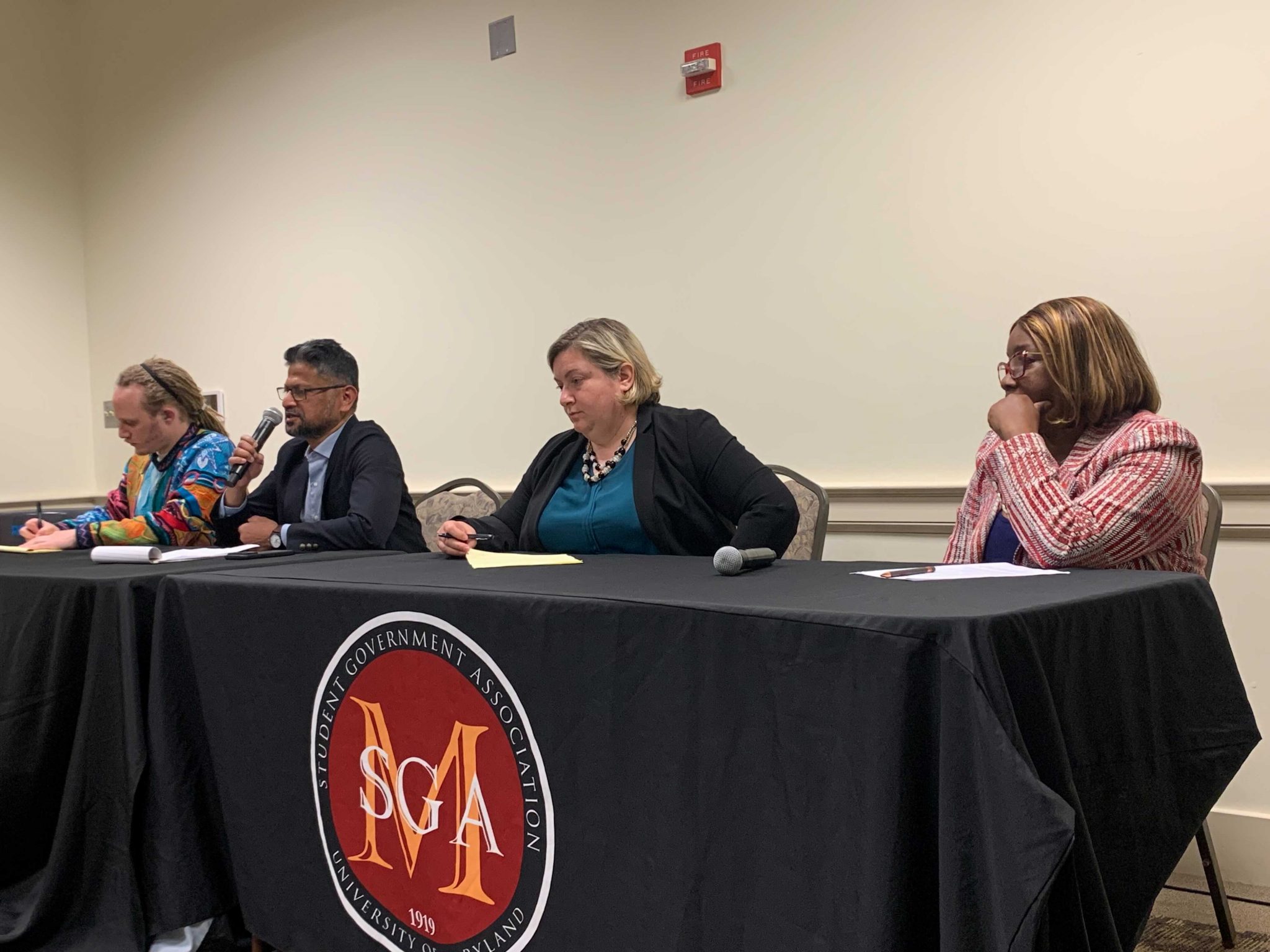University of Maryland student concerns and local businesses were at the forefront of Monday’s College Park mayoral town hall at Stamp Student Union.
All four candidates — Mayor Pro Tem Denise Mitchell, District 1 city council members Fazlul Kabir and Kate Kennedy and small business owner Bryan Haddad — were in attendance for Monday’s event, hosted by this university’s Student Government Association.
Monday’s town hall follows the April 12 mayoral debate and April 15 mayoral candidate forum in the run-up to the special election on May 6.
Here’s what the candidates had to say on several key issues.
Business Closures
Several businesses have announced closures in recent months, including Bagel Place and Target, prompting questions about the strength of College Park’s business scene.
To address these concerns, all four candidates highlighted the importance of supporting local small businesses.
In the past, the city has focused too much on larger businesses, rather than smaller and medium-sized businesses, Haddad said.
Haddad, owner of the Bamboo Eater, proposed a “vacancy tax” to protect small businesses from high rental rates. The proposal would tax landlords for having empty units, encouraging them to lower rents to support businesses.
Kabir hopes to grow small businesses by encouraging this university’s students to stay in the city after graduation.
“[This university’s students] have talents and [they] can actually contribute by starting a new business,” Kabir said.
Kabir also stressed the importance of aesthetic programs to attract more businesses to the city. He mentioned the Hollywood Commercial District Streetscape project, an initiative that revitalized the city’s commercial district, as a crucial initiative moving forward.
[UMD shuttle bus hits pedestrian outside Wicomico Hall]
Mitchell hopes to incentivize businesses by using state and federal money to build programs that would anchor and draw businesses to the city. She also plans to create a program to assist residents starting small businesses.
With the Purple Line slated to open in 2026, Kennedy cited how its emergence will incentivize business growth, even before it is finished.
Students and the Council
With students in attendance at Stamp, candidates discussed ways to increase student engagement in the community and cater to the population’s unique needs.
Many city council members emphasized the connection the city council has with its student liaisons.
“We really yield to them in regards to the student concerns,” Mitchell said.
Mitchell hopes to strengthen this relationship by encouraging students to get involved with city boards and commissions.
Kabir has created multiple community-driven events, including “College Park Day” which he said builds connections between students and residents.
“Oftentimes, we think that [students are] different, which is very wrong and very unfortunate,” Kabir said.
Haddad agreed with Kabir and highlighted that students and residents often have very similar needs.
The city and this university’s students should have honest and transparent interactions, Haddad said.
Kennedy took a more policy-centered approach to her plans. Along with other city council members, she is working to create a weekend pedestrian walkway on Knox Road to protect pedestrians from drivers and encourage students to party outside of the neighborhood.
“The more we can create safe spaces that are on campus or in public spaces and not in the neighborhoods, the better it is for the neighborhoods and families that live there,” Kennedy said.
Lowering Food Insecurities
Candidates said they hope to expand affordable food options for students and city residents.
Mitchell said she is in talks to bring in an affordable grocery store in place of Target on Route 1 after the business closes in May.
“Your money has to go a long way when you don’t have that money to be able to purchase the food that you need,” Mitchell said.
Haddad added that while grocery stores that have opened in College Park are higher quality, they are not necessarily the cheapest options for residents.
Continuing to support food insecurity programs garnered support from several other candidates.
Kabir touted his role in starting the Hollywood Farmers Market in North College Park and has supported local food insecurity programs such as the College Park Community Food Bank and Meals on Wheels.
Similarly, Kennedy works with No Kid Hungry, a movement to address child hunger. She has also played a key role in the city council supporting a state law to give eligible college students Supplemental Nutrition Assistance Program benefits, increasing healthy food options for low-income students.
[College Park City Council aims to increase student engagement in city affairs]
Affordable Housing
All four candidates also hope to address high rent costs across the city.
Haddad highlighted how his proposed “vacancy tax,” a tax on apartment buildings for empty units, would encourage apartment managers to lower rental costs to adhere to market demand.
Mitchell said she hopes to work with property managers of new apartment buildings to discuss affordable rent for students.
“I know that the rents are high,” Mitchell said. “We do need to find some way for affordability.”
Both Kennedy and Kabir plan to address rising rent costs by building more affordable housing options.
Kennedy is pushing to increase the housing supply in the city to lower prices. The council member has also worked with the College Park City-University Partnership to create a housing trust.
Kennedy and Kabir each support the city council’s plan to increase taxes on large developments and apartment buildings to award grants to student renters.



